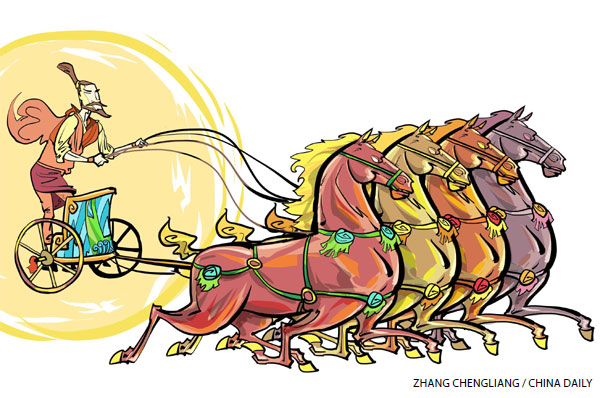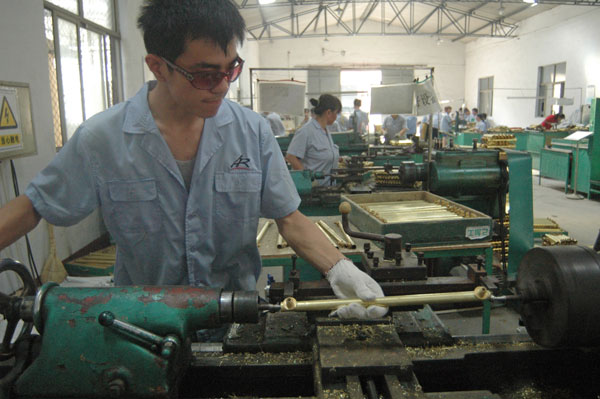Xi makes his governance comprehensive
Updated: 2015-08-07 09:24
By Robert Lawrence Kuhn(China Daily Europe)
|
|||||||||||
US officials preparing for visit of chinese leader would do well to take note of his actions
President Xi Jinping will be making a crucial state visit to Washington at a time when most American China watchers have become pessimistic about Sino-US relations. While the optimum strategy for both sides is to focus on issues that unite us - economic growth, climate change, green technologies, regional wars, terrorism, organized crime, pandemics, and the like - it is also helpful for US policymakers to appreciate what is really going on in China.
I've been speaking with US-based China experts and their general perception is that with respect to political reform and civil society, China is regressing.

These are multifaceted issues and there is misunderstanding, but this is precisely why anyone concerned with China should be familiar with Xi's "Four Comprehensives", his overarching political theory. While foreigners often dismiss the political aphorisms of China's leaders as simplistic sloganeering, they miss an opportunity to enrich their understanding of the realities of China. Chinese officials certainly take the "Four Comprehensives" seriously. I know: I've had private conversations and conducted public interviews (for Closer To China on CCTV News) - and here is what I found.
First is the obvious effort to promote, at home and abroad, Xi's way or style of governance and his high-level, integrated political thinking. But why governance? Why "Four Comprehensives"? And how do they relate?
Start with Xi's unprecedented book, Xi Jinping: The Governance of China, which presents his political philosophy, symbolizes his rapid emergence as a strong leader, and communicates his way of thinking. Since the book was published in October 2014, Xi put forth his "Four Comprehensives", enumerating what he contends are the four most critical categories for making the Chinese Dream, his grand vision, a reality.
Xi's governance book emphasizes improving people's lives, reform, rule of law, and Party building. These then became codified in Xi's Four Comprehensives: Comprehensively build a moderately prosperous society; Comprehensively deepen reform; Comprehensively govern the nation according to law; and Comprehensively strictly govern the Party. In short, the Four Comprehensives express Xi's approach to governance.

But each of the Four Comprehensives has its own nature, a distinct linguistic character. "Moderately prosperous" is a goal. "Deepen reform" is a means. "Rule of law" is a principle. Strict discipline of the Party is an action or state of affairs. Moreover, each has been a major policy in itself, suggested and supported by previous leaders for many years: "moderately prosperous society" since 2002 (13 years); "reform" since 1978 (37 years); "rule of law" since at least 1997 (18 years); "discipline of the Party" (in a sense) since the Party was founded in 1921.
So what's Xi's purpose for combining the four now? What's the structural commonality? What's the unifying innovation?
As I see it, the Four Comprehensives emerge as Xi's prevailing political philosophy of governance via two linguistic devices and two pragmatic purposes. The linguistic devices are (i) combining the four policies into a single idea, and (ii) using the same word "comprehensive" as a descriptor of each. Combining them makes the point that these four are fundamental, the basic drivers, and that if achieved, all else to realize the Chinese Dream would follow. "Comprehensive" signals two notions: (i) each policy is facing critical challenges in the "new era" of the "new norm", such that each must be expanded beyond its prior formulation, and (ii) Xi is making a very public commitment to each policy, such that there is now no turning back.
The pragmatic purposes are (i) a candid compilation of experiences and assessment of current conditions and (ii) a priority to implement and act in order to achieve the unifying goal for 2020 - realizing a "moderately prosperous society". As only five years remain until 2020, the Four Comprehensives highlight the deep-rooted obstacles that must be overcome and the need for a clarifying call to action to make the Chinese Dream a reality.
A senior theorist said that the Four Comprehensives are a "systematic approach to specific actions that directly benefit the people", a "new kind of theory" that demands specific implementation, and like subjects in school, "we will get a grade on each of the four; the people will give us our report card".
How does "comprehensively" enrich the long-standing goal of a "moderately prosperous society", the first comprehensive? For example, farmers and the poor must be included. Speaking to the Politburo, Xi said: "The most arduous task for China to comprehensively build a moderately prosperous society lies in the vast rural areas, especially in those impoverished rural areas." Farmers, Xi said, must participate as equals in the process of reform and development so they too can enjoy its fruits.
"Deepen Reform", the second comprehensive, is the ""driving force" or "engine" of Xi's governance. The 3rd plenary of the 18th CPC Central Committee (in November 2013) passed 336 top-level action items: 80 were achieved in 2014; 256 remain. The message to officials is "focus on action; have a clear plan; know your numbers" - every administrative region (province, city, county) must have its numbers and implement accordingly. I hear also of the "hard bones" of "interest groups" and "taking away their cheese". (Interest groups are defined broadly as whoever protects the status quo - typically some kind of monopoly or quasi-monopoly - and the larger the resources they control, the fiercer they fight to resist reform.)
"Rule of law", the third comprehensive, is perhaps the most misunderstood. While foreigners may focus on isolated cases, recent judicial reforms are a milestone: The power to control the court system - from financing the judiciary to selecting judges - is being transferred from the local level to the provincial level. The objective is to prevent local interference in the fair and equitable adjudication of cases and administration of justice for the vast majority of the Chinese people.
"Strict discipline of the Party", the fourth comprehensive, stresses Xi's relentless determination to root-out corruption (bagging "tigers" and swatting "flies"), and to shrink the wasteful and detested perks of officialdom. Just as a blacksmith needs a hard hammer, an analogy goes, the Party needs strong members.
Xi's governance and Xi's Four Comprehensives work complementarily and recursively - the Four Comprehensives shaping governance and governance empowering the Four Comprehensives. It is as if Xi is making governance a "Fifth Modernization". (In 1978, when reform began, Deng Xiaoping established the "Four Modernizations" - agriculture, industry, science and technology, and ational defense - as the core of China's policy.)
Now for the new era, Xi is challenging China to enhance its governance, which must be systemic as well as systematic.
China wants the world to understand Xi's governance. That's good for China, good for the world. To work with China, US policymakers should take note.
The author is an international corporate strategist and political/economics commentator. His CCTV News show, of which Adam Zhu is executive producer, is Closer To China with R.L.Kuhn. The views do not necessarily reflect those of China Daily.
(China Daily European Weekly 08/07/2015 page10)
Today's Top News
China asks further probe into MH370
'New Suez Canal' opened for ship traffic
China's property taxes coming soon
Seven arrested for trafficking women into sex slavery in China
ROK's ex-first lady begins
DPRK visit
Australia to continue search for MH370
Turkey says coalition to launch 'comprehensive battle' against IS
17 armed forces take part in Russia military contest
Hot Topics
Lunar probe , China growth forecasts, Emission rules get tougher, China seen through 'colored lens', International board,
Editor's Picks

|

|

|

|

|

|






